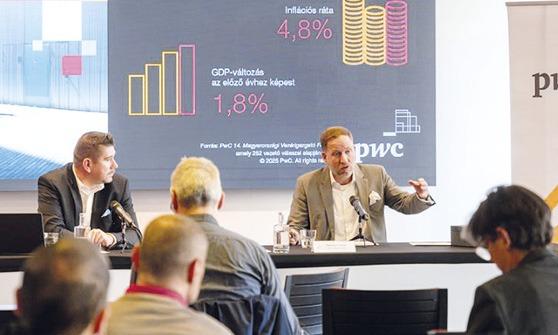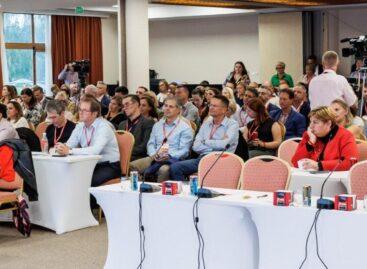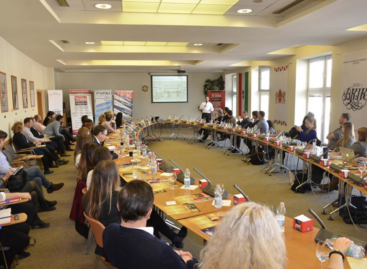PwC’s Hungarian CEO Survey: growing confidence, cautious expectations
PwC Hungary’s 14th CEO survey was conducted in the last quarter of 2024, with the participation of 252 Hungarian executives.
This article is available for reading in Trade magazin 2025/4.
Hungarian CEOs have record confidence in global economic growth, with 70% expecting acceleration, significantly above the global average (58%) – and only 10% expecting a slowdown. For the Hungarian economy 60% of think growth will continue. CEOs forecast an 1.8% GDP growth, 4.8% inflation and a euro exchange rate of 415 forints. However, only 39% of them calculate with an increase in their sales revenue.
“Hungarian CEOs are more confident than ever before about global and domestic economic growth and less confident than any time earlier about their own revenue growth”,
says PwC partner Szabolcs Mezei.

CEO László Radványi and partner Szabolcs Mezei (from right to left) presented the findings of the survey to the press
Challenges in three areas
Three priority areas are particularly challenging: lack of professionals, macroeconomic and geopolitical uncertainty, and cyber security threats. 44% of CEOs are afraid of not having enough professionals, far more than the global average of 23%. Geopolitical and macroeconomic uncertainties also remain a major concern: 36% of companies expect geopolitical conflicts to affect business life, while 38% see macroeconomic volatility as a significant risk factor. 38% of CEOs are concerned about cyber risks, a strengthening trend compared to previous years (35% in 2023, 33% in 2022).
AI: we use it, but we are afraid of it
As regards acquisitions and mergers, 29% of Hungarian companies plan to buy other companies in the next three years, compared to 55% globally. Hungarian firms would primarily acquire other companies in their own industry, while globally CEOs are more likely to look for acquisition opportunities to enter new markets. AI is playing an increasingly important role in the operations of Hungarian firms. Nevertheless, confidence in the technology is still low: only 38% consider it trustworthy, mainly due to data security risks and regulatory uncertainties. 40% of CEOs say AI will increase efficiency without making workers redundant, while 15% expect a reduction in workforce demand.
Sustainability is still more of an external expectation
Although the effects of climate change are becoming more pronounced, the majority of Hungarian companies still don’t think of sustainability a strategic priority. 66% of Hungarian CEOs don’t include it in their performance assessment at all, compared to only 40% globally. In 2024 56% of companies made climate-friendly investments, but most of these weren’t strategic decisions, but cost-cutting or government subsidies. László Radványi, the CEO of PwC Hungary has pointed out that the remuneration system for Hungarian CEOs doesn’t encourage the management of climate change risks.
CEOs: short cycles, long-term challenges
PwC’s Hungarian CEO Survey didn’t just analyse the economic situation and the strategies of companies, but also shed light on how executives see their own role and future. The research reveals that leadership is becoming increasingly cyclical, with senior executives expecting faster changes. Only 12% of Hungarian CEOs plan to stay in their current position for more than ten years, while 37% plan to stay in their present role for 3-5 years and 18% for 6-10 years. At the same time CEOs are divided over the long-term survival of their companies: 60% believe that their company will remain viable for more than ten years with the current strategy, while 40% reckon that major changes will be necessary to stay on the market.
Strong on strategy, but there is room for improvement
Hungarian CEOs feel they excel in strategic decision-making (71%) and in achieving corporate goals (75%), but see more room for improvement in marketing and sales (48%) and media relations (25%). This says that managers are strong mainly in internal business processes, but need to get better at customer relations and communication. The leadership role is becoming increasingly complex and 87% of CEOs believe it is important to develop their digital skills, while 80% say they need to pay more attention to human resources. PwC’s research clearly shows that the key to success is to adapt quickly and think in the long term. //
Related news
Record-breaking Black Friday in online orders
🎧 Hallgasd a cikket: Lejátszás Szünet Folytatás Leállítás Nyelv: Auto…
Read more >We took you on a flight! (Part 2)
🎧 Hallgasd a cikket: Lejátszás Szünet Folytatás Leállítás Nyelv: Auto…
Read more >AI Readiness Index 2025: we are more prepared now
🎧 Hallgasd a cikket: Lejátszás Szünet Folytatás Leállítás Nyelv: Auto…
Read more >Related news
“Proven recipes and new waves” – trade marketing in the coming years (online, free conference)
🎧 Hallgasd a cikket: Lejátszás Szünet Folytatás Leállítás Nyelv: Auto…
Read more >Hungarians view smart homes as an investment – MediaMarkt research
🎧 Hallgasd a cikket: Lejátszás Szünet Folytatás Leállítás Nyelv: Auto…
Read more >We gained 4,500 years back in six years – this is how Kifli.hu changed shopping
🎧 Hallgasd a cikket: Lejátszás Szünet Folytatás Leállítás Nyelv: Auto…
Read more >








